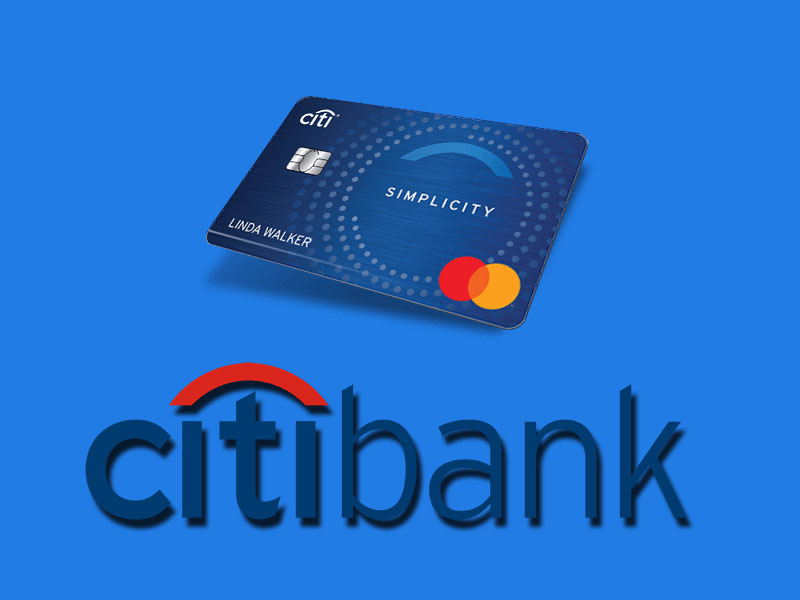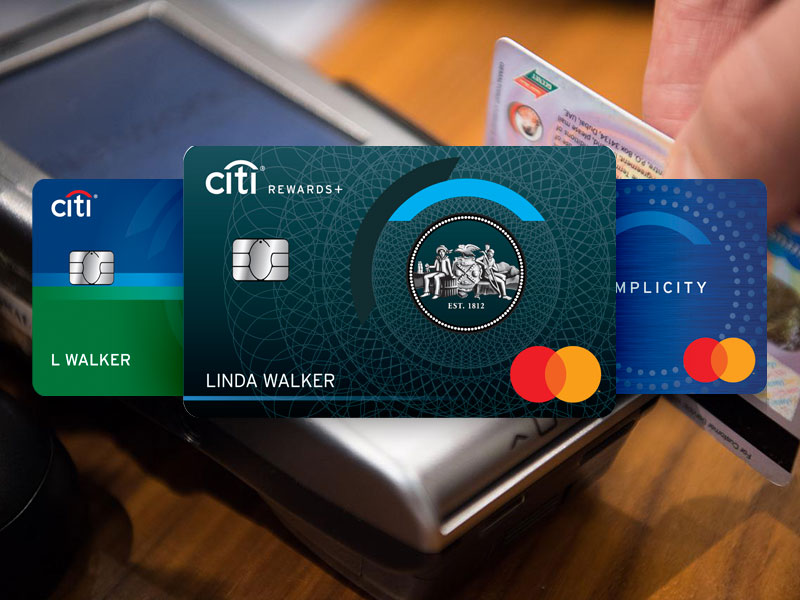The owner of CitiCards, CitiBank, is a large bank with an interesting past. While strict requirements keep the bank from maintaining customer accounts, the credit card offerings lead the industry globally. Despite its leadership role, though, not all CitiBank credit card offerings are suitable options for all people.
The Consumer Financial Protection Bureau provides tools and guides to help you weigh your credit card options. If a CitiBank card is on your bucket list, some of the company’s options are better than others. Before applying for any credit card, weigh the pros and cons against your expectations.

Table of Contents
1. CitiCards Simplicity
The Citi Simplicity Card is one of the company’s most popular credit cards. The card has a 0% interest window for 12 months on purchases and 21 months on balance transfers. Additionally, there are no late fees, and you can select your due date.
To take advantage of these highlights, however, applicants need a good to excellent credit rating. Those who wish to apply must have a score of 690 or better. When deciding if the Simplicity Card is right for you, review the features to understand whether they are worth the responsibility of card ownership.
Pros
Most credit card issuers apply late fees or interest rate hikes with late payments. The Simplicity Card does not levy fees or raise rates for late payments. Additionally, customers do not need to pay an annual fee to use the card.
The beauty of the card, as the name suggests, is its simplicity. Consumers do not need to worry about interest rates, rewards, or fees. CitiBank even allows cardholders to name their due date. The due date is not set in stone, either. If your circumstances change, you can alter the payment date for a time that suits you.
Cons
All CitiCards have certain drawbacks, and while it is challenging to find them with this card, they exist. First, the card has no rewards program, which is a bummer for some applicants.
Second, the balance transfer and foreign transaction fees are high. The transfer fee is about 3%, an industry-standard, but it can rack up your expenses. The foreign transaction fee is 3%, which can be problematic for travelers. Finally, the card requires a good credit score, which can remove people from the applicant pool.
Who Is the Card Best For?
The Simplicity Card from Citi is an excellent bare-bones option. It is a credit card for those people with good to excellent credit. Applicants may flock to the card because of its fee-free structure and lack of penalties. Still, remember the benefits of the card are few.
CitiBank does offer cards with more excellent benefits, but the flexibility of Simplicity is the primary draw to the card. You will not find a more straightforward and appealing option. If you are hoping for rewards programs and cashback options, however, check out these next reviews.

2. CitiCards Costco Anywhere
Are you a loyal Costco member? If so, the Costco Anywhere Card by Citi offers plenty of rewards and benefits for you. You do need to maintain an active Costco membership to continue earning rewards.
The Costco Anywhere car is an anywhere card. If Visa is an accepted form of payment, you can use this Citi credit card. The real benefits are for avid restaurant-goers, Costco shoppers, and travelers. Unfortunately, you need an excellent credit score to secure this card (a 720 or higher).
Pros
As with the Simplicity card, the Costco Anywhere card has no annual fee. Additionally, the card has no foreign transaction fees.
The most significant advantages of the card are found in its rewards program. Cardholders can expect cash back on many purchases, including:
- 4% cashback on gas (up to $7,000 per year, then reverts to 1%)
- 3% cashback at all restaurants
- 3% cash back on eligible travel purchases
- 2% cash back at Costco
- 1% cash back on general purchases
With all the cash back rewards, it is like the credit card is paying you. The Costco card is an excellent option for Costco members.
Cons
The primary drawback of the Costco card is the restriction on Costco. You cannot use the card without paying for an annual Costco membership, which can feel like an annual fee. Additionally, while the rewards are excellent, you must use them on Costco purchases. Additionally, you can only redeem the rewards once per year, in February.
When you review the cons, the card seems a little less exciting. Then you need to consider the card is only available to those who have excellent credit. All in all, the Costco Anywhere card is restrictive.
Who Is the Card Best For?
The Costco card is a lucrative option for specific applicants. Someone with excellent credit who frequently shops at Costco can enjoy the advantages of this card. While they can only use the rewards once a year, a cardholder can rack up many rewards in that time.
The Costco Anywhere Card is not for every consumer or Costco shopper. The high credit requirements and dependence on membership might deter even qualified candidates. Still, if you want a lucrative cashback option in your wallet, this may be the card for you.
3. CitiCards Diamond Preferred
The Citi Diamond Preferred Card is on par with the Simplicity Card, favoring good credit. The card requires a credit score of 690 or higher, with some sites recommending a minimum score of 750. These score requirements are on par with several CitiBank cards.
This credit card comes with a long introductory 0% APR on balance transfers and purchases. Thus, it can be an excellent option for consumers looking to consolidate debt. It helps to weigh the pros and cons before making any final decisions.
Pros
The Citi Diamond Preferred Card comes with a generous introductory 0% APR. Most credit issuers limit introductory offers to six months to a year, but this card is 18 months. The 18-month offer is on purchases and balance transfers. Additionally, the Diamond Preferred card has no annual fee.
The card also provides a lot of consumer or cardholder control. As with the Simplicity card, the Diamond Preferred option allows you to choose your due date. Additionally, the cardholder account enables users to control spending and watch for fraud.
Cons
As with other CitiCards, applicants need to consider the drawbacks of the card. Like the Simplicity card, the Diamond Preferred card has no rewards options. The only incentive of the Diamond Preferred Card is the introductory APR.
The average APR for consumers with good or excellent credit is between 14% and 22%. The expected APR after the introductory rate for this card is between 14% and 24%. It is possible for a cardholder to pay an interest rate over the industry average. Therefore, cardholders should be careful about carrying debt from month to month once the introductory offer expires.
Who Is the Card Best For?
Those who stand to gain the most from the card are people looking to transfer debt or make a big purchase. The 18-month introductory rate of 0% means cardholders can focus on payments without interest.
Still, the card is only beneficial if you can get approved. With a necessary credit score of 690 or 750, many people will not qualify.
Honestly, if you are not considering the balance transfer feature, the card is not worth it. For many consumers, a card with no rewards is a waste of available credit because it does not work for you.
4. CitiCards Rewards+
The Citi Rewards+ Card is ideal for people who make many small purchases. The card offers rewards through points that rack up with each purchase. The real benefit is in smaller buys because the card rounds up the points whenever you buy something.
Like most CitiCards, the Rewards+ card requires a good to excellent credit score. Some financial experts recommend having at least a 700 credit score before applying. Remember, too, that approval is not only about credit scores; it is also about credit history.
Pros
The primary benefits stem from the rewards program and the rounding up of points. Cardholders receive two thank-you points for purchases at gas stations and supermarkets. They also receive one point for every dollar they spend on other purchases.
The program automatically rounds points to the nearest 10 points per purchase. Therefore, if you spend $2 on a snack, you receive 10 points instead of two. Thus, smaller purchases can be more beneficial. Additionally, CitiBank offers 15,000 thank-you points for cardholders who spend $1,000 on qualifying purchases in the first three months.
Cons
Depending on your credit history, you might end up with a high APR (about 24%). Still, as excellent credit is a requirement for approval, you may get an APR closer to 14%. If you are afraid your credit history will lead to a higher APR, consider taking steps to clean up your report.
The Rewards+ card also has a 3% balance transfer fee but a maximum fee of $5. The 3% rate is relatively standard across credit card offerings.
Finally, CitiBank caps reward bonuses at $6,000 for supermarkets and gas stations. While other categories do not have a cap, some cardholders might feel the cap is too low for those purchases.
Who Is the Card Best For?
The Rewards+ card is best for people with excellent credit. It is also ideal for those who use credit cards for gas station purchases and grocery shopping.
This card benefits people who capitalize on the no minimum purchase offer and rounded points. If you get approved for the card and use it to make small purchases, you can quickly rack up rewards.
5. CitiCards Double Cash
For applicants with good to excellent credit, the Citi Double Cash Credit Card is among the best flat-rate cash back cards available. Unfortunately, it also comes with a potentially hefty APR (up to 24.24%). Despite the APR, however, the Double Cash card has a lot to offer the right applicant.
Are you the right applicant? You need to consider your credit situation and your expectations for the card. Focusing on the pros and cons can also help determine your interest in the card.
Pros
Like other CitiCards, the Double Cash card offers a long introductory APR of 0%. The initial term is 18 months, but only on balance transfers, not purchases. A potential workaround to the “no purchases” rule is to buy items with another card and transfer the balance.
The Double Cash card also has no annual fees, which seems relatively standard with CitiBank cards. Cardholders also have access to their FICO credit score.
The most significant benefit of being a Double Cash cardholder is 2% cashback on all purchases. The program works by rewarding a cardholder 1% on purchases and another 1% on payments, which is unique.
Cons
Users love the 2% cashback option on the Double Cash card, but they must pay their balance every month. If you fail to pay the balance, you only receive 1% cash back on purchases.
An additional drawback to the card is the introductory APR. While the 18-month window is nice, it is only on balance transfers, not purchases. Despite the 0% initial APR, you must still pay a 3% balance transfer fee.
Who Is the Card Best For?
The Double Cash card is for you if you want a cashback card with no initial APR. The 2% cashback reward is among the best in rewards cards, especially when the feature is for all purchases.
This card is not for everyone, though. If you like to travel, you should avoid this card because of the foreign transaction fees. Also, if your credit is not perfect, you might want to try another card.
Choosing Among Citicards
While CitiBank is not an ideal consumer bank, CitiCards offer several advantages for the savvy cardholder. If you would like to learn more about other Citi cards or credit card options, check out Fiscal Tiger. Financial and credit options are available for every consumer, even those with less than perfect credit.
Compare Citi Credit Cards against some of the other leading credit cards available!





